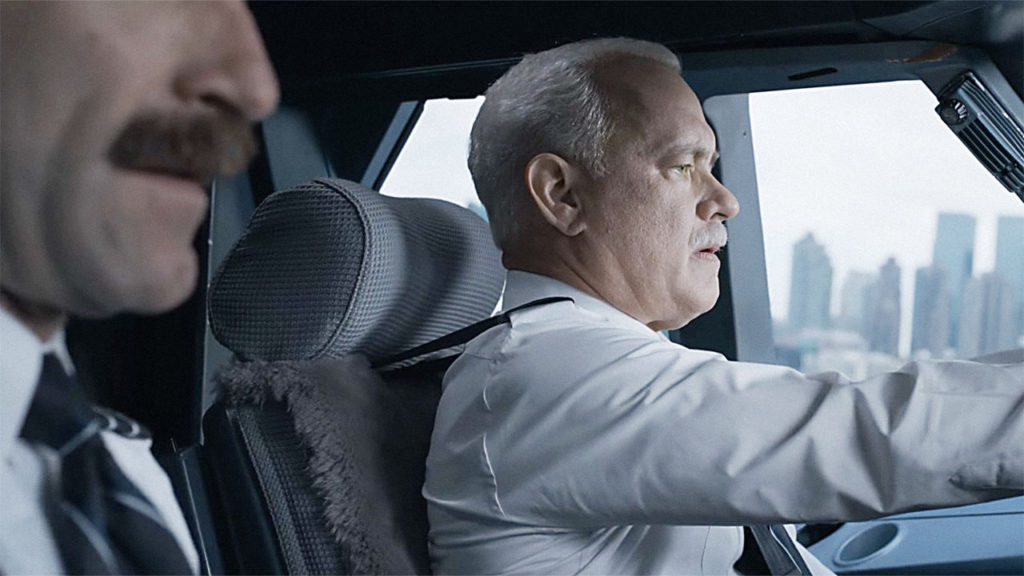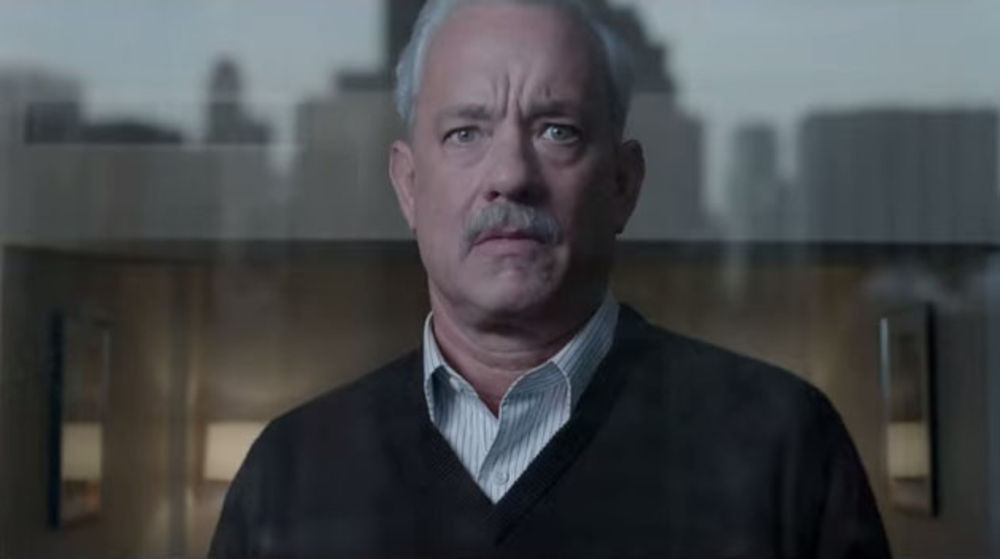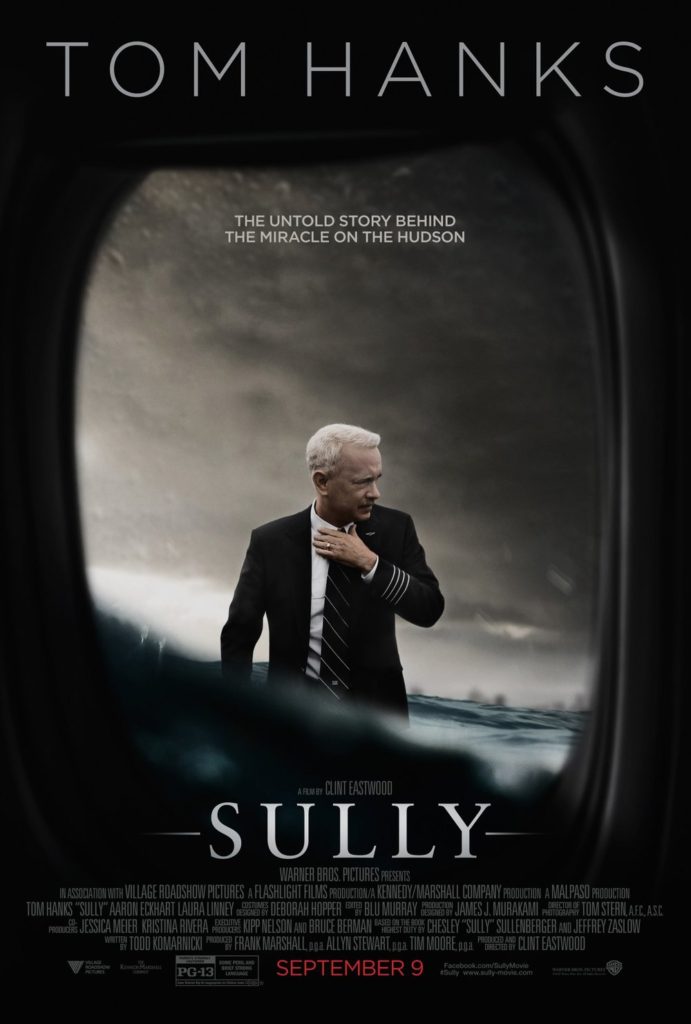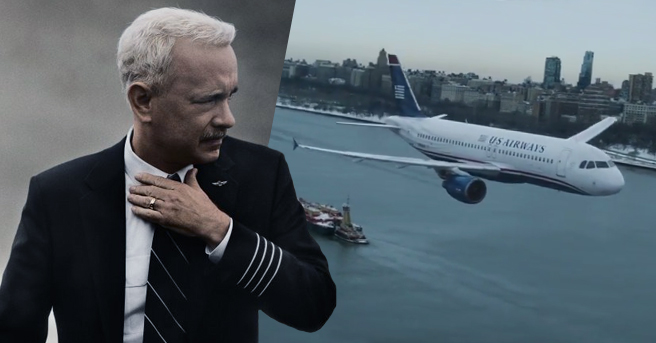
@evilbutters
Based on Chesley “Sully” Sullenberger’s autobiography Highest Duty, Sully is the true story of how US Airways pilots Sullenberger (portrayed by Tom Hanks in the film) and First Officer Jeffery Skiles (played by The Dark Knight‘s “Two Face”, Aaron Eckhart) landed US Airways Flight 1549 on January 15, 2009 in the numbing waters of the Hudson River after a flock of Canadian Geese caused Flight 1549 to lose both of its engines. Despite a few minor injuries, all 155 passengers survived the water landing.
Sullenberger is celebrated as a hero across the nation, but before he can truly enjoy it the National Transportation Safety Board (NTSB) begins its investigation and claims that the left engine was merely idle and not entirely mutilated by the flock of geese like Sullenberger and Skiles believed. The argument is made by the NTSB and later confirmed by flight simulations that the damaged aircraft could have made it back in one piece to LaGuardia Airport or even Teterboro Airport even though Sullenberger utilized his 42-years of flight experience to determine that there wasn’t enough time, speed, or altitude to land anywhere other than the Hudson River. If the NTSB finds the two men at fault, Sullenberger and Skiles would never pilot an aircraft again regardless of how many individuals were saved.
Marketing lead you to believe that Sully is incredibly similar to the Robert Zemeckis 2012 film Flight starring Denzel Washington and John Goodman. What’s really interesting is that the films are both so similar yet so different at the same time. In Flight, William “Whip” Whitaker, Sr (Washington) has no other option other than to make a controlled crash in an open field. The majority of the passengers survive and Whip’s life is turned upside down once the NTSB investigation begins. Nitpicking differences include Flight not being a true story and Whip being unable to save everyone; but Whip’s struggle with cocaine and alcohol and the chemistry between Washington and Goodman is what made the film so enjoyable.

With the Clint Eastwood-directed Sully, Sullenberger isn’t under the influence during Flight 1549 and isn’t wrestling with any sort of personal demons while Skiles doesn’t drink to begin with. Flight is spent trying to cover up the fact that Whip was drinking while piloting the aircraft and attempting to find survivors from the flight that would lie and say he was the most qualified individual for the job, but Sully revolves around two men who knew they did the right thing and are more than willing to say that those 155 people made it safely back on the ground because it was a group effort by everyone.
Both films are about saving the career of airline pilots, but Sully is fueled by human nature while Flight focuses on one man. Sullenberger is in the spotlight as this superhero that saved everyone. He’s recognized in public, the paparazzi constantly harass him at his hotel, and he even does media rounds that include live interviews and an appearance on David Letterman. Sully is mostly distracted by the fact that he’s away from his family for so long and is confident from the start that he and Skiles made the right decision.

The issue arises that being based on a true story and a book detailing those events that you probably already know how the film is going to end. Even if you don’t remember that day in 2009, you can pretty much guess how things will turn out. There isn’t much conflict because of it. There’s also this somber chemistry between Hanks and Eckhart. The two actors show a determination together that never weakens for the entirety of Sully. They share frustration, being away from their families, and being haunted by the fact that they might lose their jobs even though they did the right thing. Hanks is quietly moving as “Sully” and is obviously attempting to hold it together and be professional despite the circumstances. Meanwhile Eckhart speaks his mind and spits sarcastic quips as Skiles.
 Even with the solid performances in Sully, there seems to be something missing from the biographical drama film from really making an impact. The story is presented rather brilliantly as you’re introduced to the hectic lifestyle that Sullenberger has been thrown into because of his decision. The malfunctioning of the plane is seen later in the film and is usually triggered by something Sullenberger sees on TV. The argument can be made that Sullenberger dreams as often as Bruce Wayne did in Batman v Superman, but Sully’s nightmares and restless daydreams have more substance and meaning. Sullenberger is legitimately haunted by surviving this ordeal and is riddled with guilt over whether he made the right decision or not.
Even with the solid performances in Sully, there seems to be something missing from the biographical drama film from really making an impact. The story is presented rather brilliantly as you’re introduced to the hectic lifestyle that Sullenberger has been thrown into because of his decision. The malfunctioning of the plane is seen later in the film and is usually triggered by something Sullenberger sees on TV. The argument can be made that Sullenberger dreams as often as Bruce Wayne did in Batman v Superman, but Sully’s nightmares and restless daydreams have more substance and meaning. Sullenberger is legitimately haunted by surviving this ordeal and is riddled with guilt over whether he made the right decision or not.
Eastwood has crafted a moving picture, which allows you to feel for its main characters. You become infatuated with how Flight 1549 landed because of how it’s presented. A plane drifting the skies without any sort of momentum suddenly plummets to the earth and into your chest as the most genuine and selfless experience you will feel this week. Sympathy, compassion, and unselfish behavior are unfortunately qualities the modern world doesn’t always embrace. It’s at least a breath of fresh air to see our entertainment embrace that concept with open arms and completely soar with it. 3.5/5 Airplane Engine Mangled Geese.

